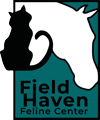Trap, Neuter, Return (TNR)
Cats are territorial and form a strong bond with the location they inhabit, and for feral cat colonies, this bond is even stronger. They are born there and have learned how to survive in that particular environment. Feral colonies will often run off other feral cats that do not belong to their colony. Therefore, relocation of a feral cat should only be considered in emergency situations (life or death) and requires proper “imprinting” for success.
Feral Cat vs. Stray Cat
It’s important to know the difference between a feral and a stray cat.
A true feral cat is wild and has not been socialized by human contact. Since they require special handling and have unique needs, they generally are not candidates for adoption into a home.
A stray cat, on the other hand, is a socialized, domestic cat that has simply lost its home. Stray cats need to be adopted. Over the years, domestic cats have lost some of their feral instincts for survival and often perish in the wild. It’s important to get these cats off the streets and place them back into loving homes, where their human companions can provide them with the care they need and deserve.
Benefits of a TNR Program
Feral cats are humanely trapped, spayed or neutered, vaccinated, and returned to their original location to live out their natural lives with their feral colony. Stray cats and kittens that can be socialized are adopted into loving homes. Other benefits of TNR include:
- Stabilization of the colony population by stopping litters of unwanted kittens from being born each year
- Reduction of unwanted behaviors associated with mating such as yowling, fighting, spraying, and roaming
- Vaccinating helps protect the human communities with which they co-exist
- Resources previously spent on ineffective methods of removal can be spent on more effective services such as subsidized neuter services, adoption, and outreach programs
Education is also a key goal of the SNAP. FieldHaven volunteers provide education on responsible pet stewardship to local youth groups, civic organizations, and schools.
How Can FieldHaven Help?
FieldHaven has a volunteer TNR Team that is available to assist with resources and years of experience. We can provide:
- Humane traps
- Low or no cost Spay/Neuter Assistance Program (SNAP)
- Cat kenneling before and after surgery
- We love to train people to trap – you’ll be surprised to learn how easy it is!
- Trapping by our trained TNR Team (if you are unable to trap)
- Colony spay/neuter management asistance
Resources are limited. Please contact FieldHaven by contacting us at (916) 434-6022 or via email before undertaking any TNR project.
It’s important that cats being TNR’d continue to be monitored by a colony caregiver. Cats in colonies should be fed using a managed feeding schedule. Feeding time provides the opportunity for the caregiver to check the colony for any sick/injured cats or newcomers. Amy, the caregiver for Mackster’s colony, observed that he was not thriving in the colony and brought him to FieldHaven for medical treatment. It was then determined that Mackster really wanted to be a housecat and not a community cat.
Resources
- Colony Caregiver Toolkit [Zip]
- National Feline Research Council
- Shelter Law – Community Cats – Bruce Wegman, attorney and Cindi Delaney, DVM 10-18-2022 (Accompanying Slides)
- NACA (National Animal Control Association) Position Statement on Free-Roaming Cats [PDF]
- Let’s Keep Community Cats in the Community
- Humane Network on Return to Field
- American Bar Association Endorses CCP and TNR [PDF]
- Basic Trapping Instructional Video (The Kitten Lady)


